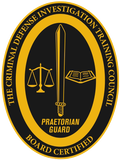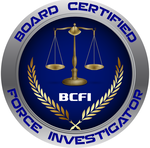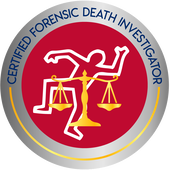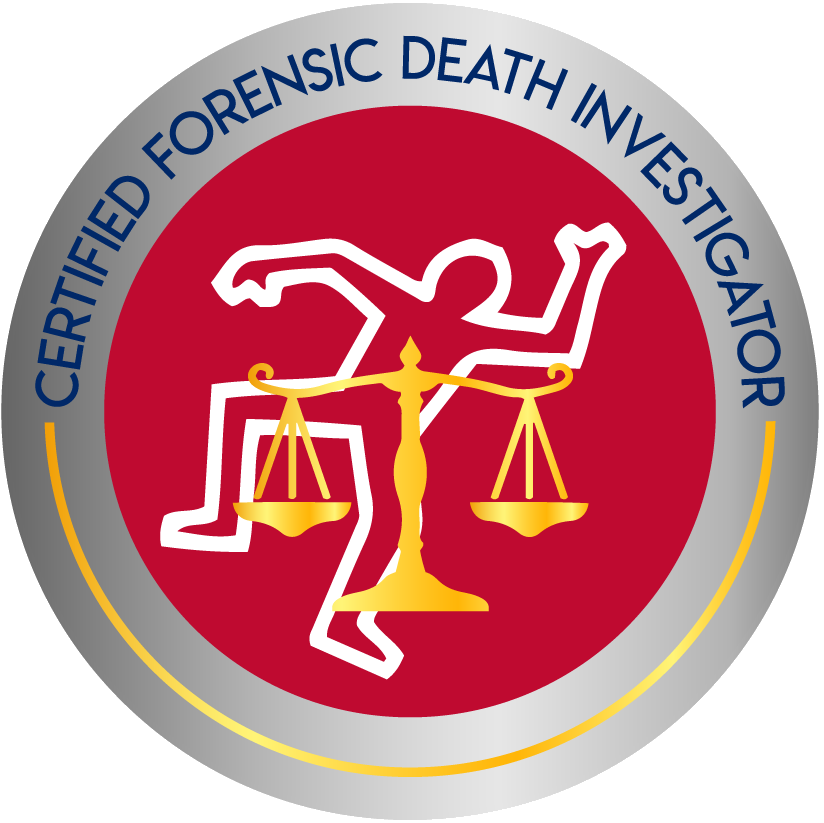The role and dedication of Criminal Defense Investigators to the defense and our judicial system cannot be overstated – it is vital in the protection of individual Constitutional rights and our judicial system. We are glad to see 2020 gone, and still looking forward to the real 2021 making itself known in our lives. What 2020 did do was give Criminal Defense Investigators opportunities for training and certification not available before.
The Criminal Defense Investigation Training Council (CDITC – Brandon Perron, CCDI – National Director) has been around for over two decades providing training and certification to Criminal Defense Investigators in the private sector, state and federal public defenders, and military investigators. During this time the founders of the 2021 CFDI and BCFI programs have known and worked with Brandon and CDITC to provide Certified Criminal Defense Investigator training and advanced certificate course training. It was no accident, and yet purely coincidence, the CFDI and BCFI programs were developed from this experience and to enhance them. Through our own experience and dedication to professional investigations, advanced training and experience, and elevating the standards through specialized certifications, we have found the Tri-Fecta of Criminal Defense Investigation training and certifications to be the CCDI / CFSI from CDITC, the BCFI from FCTC, and our CFDI Program. Each component brings its own advanced requirements, experience, training, examination, certification, and continuing education. Together, and most important – they elevate the professional Criminal Defense Investigator and the importance of criminal defense investigation to the protection of Constitutional rights to the highest standards. These are all now within your ability to learn, train, and earn these credentials through specialized distance learning platforms and professional courses and curriculums.
There are two types of certifications and two types of training available to all professional investigators – those you attend and those you complete – they are not the same. There are also two types of certifications – those which test your existing knowledge, and those which provide the training and certification. For all certifications, to our knowledge, documented experience and Continuing Education (CE) is required to be accepted and maintain the credential. Until 2020, nearly all also required in-person education and certification examination (some remote exams were available). Let us look into these nuances – pros and cons.
First – we are not familiar with all certification programs. Some we know by others certified, and others we know from published information. The following are our opinion and based on our experience.
Certification is not the same as standards or ethics – a certification program may have standards and ethics, but standards and ethics do not make a certification. Ethics and Standards apply to all professional investigators, regardless of their experience and areas of investigation. Come certifications are state based (i.e. Texas Association of Licensed Investigators and Florida Association of Licensed Investigators have their programs specific to each state and association). Certification is a personal choice and professional standard. You should be a member of your state association and strive to be certified if available. There are few national association certifications. Some are based only on experience, and others based on an examination process requiring experience. The value of any certification, in any profession, comes from earning the credential and maintaining it as an individual professional standard in advanced investigative specialties.
Two Types of Training Opportunities: Attend and Complete
There are essentially two types of training opportunities, no matter how they are provided (in-person or remote) – they are attending and completing, and there is a difference. You will find the developers of this Tri-Fecta all agree and implemented requirements to attend and complete their programs before advancing to examination. What is the difference? Most training is by seminar blocks – 60 or 90 minutes here or there, no attendance or examination requirement. These are suitable for most continuing education, and advancing one’s knowledge and skills – we have attended hundreds of hours, and also developed and presented our own. These do serve the purposes of getting valuable condensed subject training and continuing education to professional investigators. They may individually be part of a training and certification program; however, on their own they are not a substitute. To be fully immersed in a training component and like any higher education, regardless of time from one hour to one day or even one week – there must be an attendance and completion requirement, and an examination process if applicable to test both the learned knowledge of the student and the presentation of knowledge in the program. Parameters in the in-person and distance learning platforms can be set to meet these parameters of attendance, completion, and examination.
Two Types of Certifications: Test and Certify Advanced Experience and Train, Test and Certify Advanced Experience
There are also two types of certification processes – those which test your experience, background, and training; and those which do the same – and have their own specific training program, as specialized certifications. There are benefits to both. For example, a certification which is by an examination process and without training tests the existing knowledge of the professional investigator. The process of studying can be very extensive and presents their own challenges, such as the Certified Legal Investigator (CLI) Program. The benefit to the programs with their own training component are advanced, usually specialized, certifications – these should also present a challenge to the professional investigator to learn, study, and pass the examination. When the professional investigator combines multiple specialized certification and training programs specific to their specialty – such as civil plaintiff, or as presented here – criminal defense – the benefits to themselves and their clients is elevated and unequaled. The cost is an investment and should be recouped in one case to which the new advanced training and certification applies. The client investment in the certified investigator, who will charge more for their advanced subject matter expertise, is the best for their legal strategy and defendant’s Constitutional right to an competent and effective defense of themselves and their rights.
About Third-Party Mass Education and Certification Platforms
There is actually a third training and certification process – these are third-party mass education platforms. These are provided by companies who offer online training to any individual and for hundreds of professions and specialties. There is no support, no continuing education, and no true recognition of the otherwise unknown certification. These can also be very expensive – we seen them cost $2,000 to $5,000. We strongly recommend your time and financial investment be in certification programs developed by recognized and experienced experts in their fields, and also through professional associations, and which have pre-requisites and continuing education requirements developed specifically for your advancement by their own recognized and experienced member experts.

The Certified Legal Investigator (CLI) by the National Association of Legal Investigators (NALI) is the oldest (1967) and considered the highest standard for civil plaintiff and criminal defense investigators. Dean has been a CLI since June 2009 (one of the ‘Nashville Five’) and has been on the CLI Committee since 2010. Colorado had no professional licensing, and long-time friend and CLI Ellis Armistead encouraged Dean to pursue this goal after returning to the private sector from the medical examiner offices in late 2008. It was, and remains, a rigorous process which truly tests the experience and knowledge of the candidate. The CLI Program is also one of the few which offers no training – it was developed to challenge and test, and also enhance, the professional investigator's background, training, and experience. The study materials are extensive and takes months of dedication, which is finalized in a comprehensive series of a peer-reviewed white paper, comprehensive written examination, practical scenario examination, and peer ethics review.
Why is it not in this Tri-Fecta - and is the first listed? Only because it is not a training with certification program – the extensive certification process tests existing experience and knowledge – the CLI is the leader of the professional investigator certification programs – and is why it is presented first.
Visit www.nali.com/certified-legal-investigators-program for details and to set your goals.

It is no mistake you will find the Criminal Defense Investigation Training Council (CDITC) at the top of the list. It is the standard by which all Criminal Defense Investigators should set themselves and reach. It is also no mistake you will see CDITC National Director Brandon Perron – and the designation CCDI (Certified Criminal Defense Investigator) at the top of the list and found on this Tri-Fecta of Training and Certification for Criminal Defense Investigators Advisory Boards. With his brother, Brad Perron (Director – Certified Forensic Science Investigator Program – CFSI), they have set the standards for criminal defense investigations and certifications.
The CCDI Program is the credential standard for Criminal Defense Investigators – it is nationally recognized as such. It is earned by experience, training and examination with annual CE required. Experience and the attending and completion of the 16-hour CCDI Program is required, with a comprehensive final exam, following by annual CE requirements. “The CCDI program adheres to the philosophical and methodical dynamics of the Component Method of Criminal Defense Investigation.”
The CFSI Program is recommended for CCDIs to have a working knowledge of specific forensic sciences through its 8-hour program. The CFSI will be able to interpret and recognize the need for expert independent analysis, assist with the efforts of experts, and utilize their own advanced findings for the defense. “The expertise of the CFSI will enhance the capabilities of the defense team and increase the effectiveness of representation consistent with the demands of due process.”
-- For details of each program visit – www.cditctraining.com/trainingcertifications.html
Next the Board Certified Force Investigator (BCFI) and Certified Forensic Death Investigator (CFDI). These fully compliment and advance the CCDI program. It is interesting to note these programs were developed separate from each other, during the same 2020 time span, and without the knowledge of the other developers. It is no mistake, due to experience, dedication, and expertise, you will find some commonalities mixed in with the vast uniqueness of each program.

FCTC was founded by Dennis Root, CCDI, BCFI to give the professional investigator educational programs and resources designed to enhance their skills, abilities, and level of performance. It is a specialized certification program – on the use of force. As almost every criminal charge includes an act of force or violence, this is for every criminal defense investigator, and also the legal investigator in civil litigation. Developed from his years of experience, providing expert training and seminars, and providing advanced investigations and expert consultations, last year Dennis released his new book – Force Concepts – The Definitive Guide for Separating Self-Defense From Criminal Action – and this year integrated these components into the release BCFI Program. Force investigations training is not easily found for criminal defense investigators, unless they have transitioned from a career in law enforcement. This is also the first certification process in force investigations for private sector professional investigators. With the BCFI, the FCTC is dedicated to serving their credentialed members, and providing the tools and information to achieve personal and professional goals. This is before, during, and after completing the BCFI program. “From the law to humans performance, the force investigator must know what evidence is left behind by these life-changing events. They must recognize the impact fear has on human performance and how to investigate that fear. Force investigations demand the investigator understand time & distance considerations, real-world observational capabilities, video analysis and interpretation, and more.”
-- For details of this program visit – www.ForceConceptsTraining.com

This concept developed with our Equivocal Death Investigator course for PI Education (a great source for various professional investigator continuing education) in 2010. In 2012 we enhanced the program for our Investigative Courses website (www.InvestigativeCourses.com), and in 2020 made an additional information and presentation improvements in preparation as a pre-requisite for a training and certification program. We approached Brandon Perron and Brad Perron at CDITC to partner for accreditation through CDITC. Why did we do this? Two reasons – 1) the CDITC is the recognized criminal defense investigation training program and association – and they are recognized leaders; and 2) we are passionate about both criminal defense as a Constitutional right, and also knowing how important the subject matter of Death and Serious Bodily Injury (SBI) investigations are to criminal defense. Having trained and earned the CCDI and CFSI credentials, and also presented training for the CCDI Academy, we thought this was perfect. Starting in July 2020 we began development of the curriculum specific to the process of Death and Serious Bodily Injury (SBI) investigations in criminal defense. No components of this curriculum are available outside of the CFDI Program and CDITC. It is the first of its kind specifically for Criminal Defense Investigations of Death and Serious Bodily Injury (SBI). The CFDI is first immersed in the concepts of Death and Serious Bodily Injury (SBI) investigations through the pre-requisite Equivocal Death / SBI Investigations for PIs Certificate Course, and then the process of review, analysis and independent investigation specific to criminal defense. It is encouraged for the CFDI to then apply their advanced skills, knowledge and experience to becoming a Subject Matter Expert (SME). “Once you have earned your CFDI, you will enhance any Criminal Defense Investigator skills, and all CDITC and other preeminent certifications and experiences to bring your Criminal Defense Investigations to a new level of advanced knowledge and skills for the most demanding Criminal Defense Investigations areas – involving Death and Serious Bodily Injury (SBI) incidents. You will also have unique access to collegial networking and continuing education.”
-- For details of this program visit – www.CertifiedForensicDeathInvestigator.com
The area of criminal defense investigations is about a defendant’s Constitutional rights, an effective and vigorous defense, and uncovering the truth through facts and evidence. We are all familiar with a defendant’s Constitutional rights to an attorney, to remain silent, to a jury trial, and to confront their accusers. We also know they are innocent until proven guilty. Many do not realize the defendant also has a Constitutional right to an investigator and forensic experts. Together, we strongly feel the CDITC, FCTC, and CFDI training and certification programs bring these together – not just for the Criminal Defense Investigator, but also for the defense attorney – and most important, the defendant. Every criminal defense case needs a trained investigator who knows the investigation process and Constitutional rights of the defendant, as well as potential legal strategies and various rules of evidence, rules of procedure, and the involved privileges and doctrines of criminal defense. We also know most incidents resulting in serious criminal charges involve force and violence – fatal and non-fatal events. What better way to give back to our profession than developing, and endorsing, what has been proven to us and our clients as effective. We are honored to be part of this group of dedicated professionals and experts who also give back to our profession.
The certification is not actually about the certification. It is about the advanced training and continuing education, and to see fellow professional investigators so credentialed and knowing they have an advanced protocol to assist you when needed. Regardless of the certification program – find the ones right for you, your experience, and areas of specialty. Make sure it is developed by recognized experts in our profession, offered by an association or recognized experts, and requires examination of existing experience and knowledge, or includes required training, attendance, completion, and examination. All certification program should require CE to maintain the credential.
Program information and conversations of Dean and Karen Beers, Brandon and Brad Perron, and Dennis Root came together as the inspiration and information for this commentary. We extend our thanks for their personal and professional friendships, and support - and dedication to our profession.



